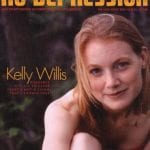Bobby Bare / Bobby Bare Jr. – Bobby Bares, all
Bobby: So it was his…
Bare: Yeah, it was his idea.
ND: So the whole business of Waylon struggling to produce his own records was more PR than it was real?
Bare: I think he just went to Jerry Bradley or somebody and said, “I want to produce my own records. Bare’s producing his.”
Bobby: He tells a big story about going to Chet and then having to really make a big fuss.
Bare: That could be true because by then, Waylon was pretty wild, you know. By then he had discovered cocaine, and I could see that it’s possible it did happen because, if I was a record company, I would be reluctant to turn Waylon loose producing his own records. Especially if he had a manager like Neil Reshen. Jesus. You don’t know what they’re gonna to do. So it’s probably true.
Bobby: Looking back on it, don’t you see how Lullabys is pretty wild? It’s pretty out there.
Bare: Well, yeah, but I knew it was really good.
Bobby: It had some good songs.
ND [to Bobby]: What do you remember about it?
Bobby: Being in the studio with Shel. Ticklin’.
Bare: Yeah, we did the very first take of it [“Daddy What If”], and did a couple more, and he kept gettin’ better, and soundin’ like we brought in a ringer. Didn’t sound like a 6, 7-year-old. We had to go back and take the very first one we did.
Bobby: Dad did an album called Great American Saturday Night….And “Painting Her Fingernails” was on that. Was that album completely done?
Bare: Yep.
Bobby: How well do you think that record could have done?
Bare: Major hits.
Bobby: It never came out.
Bare: My deal with RCA was up, and I was negotiating with RCA and CBS.
Bobby: You turned in Great American Saturday Night, your last record for RCA.
Bare: Right. And, so CBS offered me almost twice as much. Jerry Bradley said, “Here’s what we’ll do.” I told him what I’d been getting, what CBS’s offer was. He said, “I’ll give you that, but we’ll use it to pay management.” I said, “Well, I need money to live on while I’m making this record.” He wouldn’t go for it, and then he got pissed. He said, “Well, I’ll tell you one thing. If you don’t re-sign with RCA I will bury that Great American Saturday Night album. I’ll bury that, and it’ll never see the light of day.”
ND: So is it somewhere in the vaults, or did he erase it?
Bare: Yeah. It’s somewhere.
Bobby: We can’t find a copy of it.
Bare: They say they can’t, either. Doesn’t matter, I’ve just about recorded every song on it.
Bobby: What was different about touring in the ’70s versus now?
Bare: You mean big-time touring?
Bobby: What Tim McGraw’s doing.
Bare: Uh, nowhere near big productions. The money wasn’t there. You’re talking, Jesus, if you made $10,000 a night in the ’70s you were doing good, in the early ’70s. I think when Waylon was at his hottest he was probably getting 40 or 50 a night. And then he’d end up with three semis. Jack Clement said it best a long time ago. He said, hillbillies with money are crazy. Oh, no, he said they’re dangerous. They’re dangerous.
Bobby: Yeah.
Bare: They think it’s never going to end. They think it’s continuous, it’s gonna go straight up. And of course you’ve gotta have that optimism. But nothing ever lasts. It doesn’t. I’ve been lucky. I’ve been fortunate. I’ve managed to have I don’t know how many careers.
Bobby: Did the Old Dogs end up how you thought it was going to end up?
Bare: No, not really. I hadn’t planned on all the things that happened. I thought it would be much bigger. It’s big, but I thought it would be much, much bigger than it was. And of course I hadn’t planned on the Atlantic Records folks closing. When the record company folds [laughs] you’re pretty well shot. And I never planned on Shel dying.
Bobby: What about musically?
Bare: Musically, it was all that I hoped it would be, really. We had a lot of fun doing it, a lot of laughs. The best thing Shel ever did, really. The most fun, he said, of all the projects he’d done in his life.
Bobby: Y’all were mean!
Bare: What?
Bobby: All that mean stuff everybody says to each other, makin’ fun of each other. I told him about how you told Waylon, when his hands [got so] he couldn’t play, “Oh, you weren’t really that good a guitar player anyhow.”
Bare: Oh, yeah. Well, he wasn’t. [laughing]
Bobby: He was good, dad, I swear he was good. [laughing]
Bare: Well, yeah, but he wasn’t no Chet Atkins. [laughing] Or he wasn’t no Jerry Reed.
ND: Have you tried writing with your dad?
Bobby: Uhuh. A couple times.
Bare: He done good. We did good. [laughs]
Bobby: [in a stage whisper] He’s real, real good. [normal voice] And it’s effortless. He knows the right thing to do. Just knows it. And it’s an incredible reference to have. The new record, me and my friend Tony [Crow] wrote a song called “The Ending”, and that was his [Bare Sr.’s] chorus. He says, “I got a song” — he writes these [fragments] every once in a while, and most of the time I try to make it into a song….He didn’t sound like he was going to sit down and write that song, that day, so I got with Tony.




